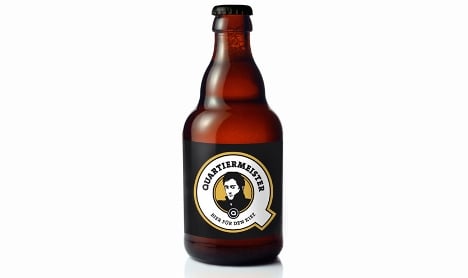This week, the dark and cosy Kuschlowski bar in a hip corner of Berlin’s Neukölln district became the eighth bar to begin serving the pilsner since the first shipment left the brewery in late August.
“It tastes good to help the world, right?” asks 30-year-old Sebastian Jacob, the enterprising young founder of the non-profit project, which aims to harness Berlin’s vibrant drinking culture for the good of the community.
Nestled into a retro olive-green sofa, Jacob describes the fundamental goals of Quartiermeister – it’s regionally produced, independent, and gives all profits to neighbourhood development projects.
“But the most important thing for me is bringing consumers an alternative that shows the effect of collective action on the market,” he told The Local.
Since launching this summer, Jacob says he has been pleased by growing sales and surprised to find that delivery for private parties may become the biggest proportion of revenue.
It probably doesn’t hurt that the beer tastes good. Jacob scoured the region for a privately owned brewery big enough for commercial production that would be willing to take part in the project. None of the big corporate breweries in Berlin fit into his idea, and the microbreweries were too micro, so Jacob decided on the 700-year-old Garley family brewery, located some 150 kilometres from Berlin in the neighbouring state of Saxony-Anhalt.
The result is their premium pilsner served in squat bottles that he describes as “a classic northern German beer that is smooth, crisp and bright.”
The bottle bears a label with the image of the mysterious imaginary Quartiermeister himself.
“The Quartiermeister, or Quartermaster, was once the officer in the military who saw to provisions in the encampments, which means he also took care of the beer,” Jacob said. “It’s also a play on the word quarter since the man on the bottle is also looking after our neighbourhood.”
The Wuppertal native came to Berlin almost four years ago to earn his law degree at Humboldt University, and the idea for Quartiermeister came to him in bed one night last winter amid the stress of final exam cramming.
“It was an exhausting time, but also a time when my mind was really sharpened and creative,” he told The Local.
Throughout his time in Berlin, Jacob has lived in the scrappy multicultural Neukölln district, or Kiez, as Berliners say.
The name of his beer is an indicator of what he hopes it will do for the district he loves, and later for the city’s other districts.
For every case of beer sold, the €3-profit currently goes to one of two Neukölln district initiatives – Bildog, a programme that provides extracurricular activities for kids from an immigrant background, and football club NFC Rot Weiß Neukölln, which is working to get entire immigrant families involved in sports.
Now that the project is up and running, Jacob says most of his energy is spent searching for new community programmes to fund.
His community needs educational outreach the most, Jacob says, but convincing some initiatives that deal with children to accept funding raised through alcohol consumption has proved a bit of a challenge – particularly in an area where many families come from a conservative Muslim background.
One initiative’s board recently decided not to go through with a Quartiermeister partnership, but Jacob said the success he’s already had means there’s nothing to be discouraged about.
“There has been some resistance, but it can be overcome,” he says, explaining that the football club organisers view the funding as part of a collective community project, and not simply about alcohol.
“Beer will be consumed anyway, we’re just directing the results in the right way,” Jacob says, adding that beer may in fact be the best product for such a social outreach programme.
“It’s a product that is consumed socially, and in Germany, usually locally too. In Berlin people drink Berliner beer, in Cologne they drink Kölsch. All I have to do is combine this and get people to drink for their community.”



 Please whitelist us to continue reading.
Please whitelist us to continue reading.
Member comments